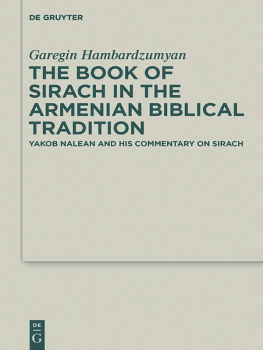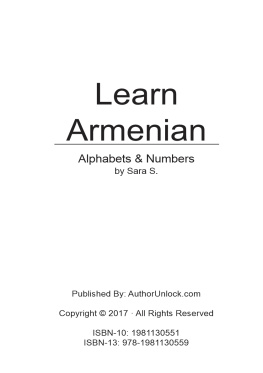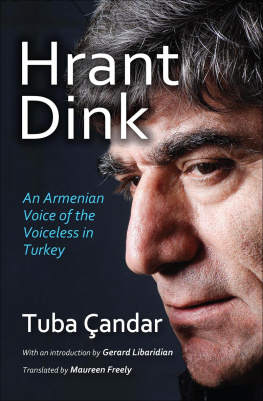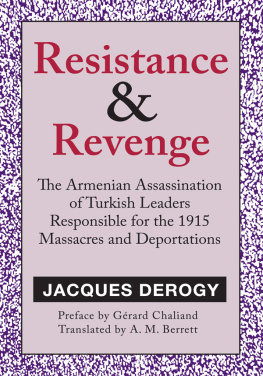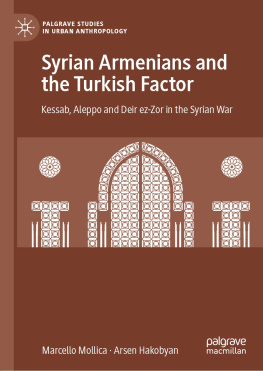Kherdian David - The road from home: the story of an Armenian girl
Here you can read online Kherdian David - The road from home: the story of an Armenian girl full text of the book (entire story) in english for free. Download pdf and epub, get meaning, cover and reviews about this ebook. City: New York;Turkey, year: 1995, publisher: HarperCollins;Beech Tree, genre: Home and family. Description of the work, (preface) as well as reviews are available. Best literature library LitArk.com created for fans of good reading and offers a wide selection of genres:
Romance novel
Science fiction
Adventure
Detective
Science
History
Home and family
Prose
Art
Politics
Computer
Non-fiction
Religion
Business
Children
Humor
Choose a favorite category and find really read worthwhile books. Enjoy immersion in the world of imagination, feel the emotions of the characters or learn something new for yourself, make an fascinating discovery.
- Book:The road from home: the story of an Armenian girl
- Author:
- Publisher:HarperCollins;Beech Tree
- Genre:
- Year:1995
- City:New York;Turkey
- Rating:4 / 5
- Favourites:Add to favourites
- Your mark:
- 80
- 1
- 2
- 3
- 4
- 5
The road from home: the story of an Armenian girl: summary, description and annotation
We offer to read an annotation, description, summary or preface (depends on what the author of the book "The road from home: the story of an Armenian girl" wrote himself). If you haven't found the necessary information about the book — write in the comments, we will try to find it.
The road from home: the story of an Armenian girl — read online for free the complete book (whole text) full work
Below is the text of the book, divided by pages. System saving the place of the last page read, allows you to conveniently read the book "The road from home: the story of an Armenian girl" online for free, without having to search again every time where you left off. Put a bookmark, and you can go to the page where you finished reading at any time.
Font size:
Interval:
Bookmark:
The Story of an Armenian Girl

To the Memory of Lousapere Dumehjian
September 16, 1916.To the Government of Aleppo.
It was at first communicated to you that the government, by order of the Jemiet, had decided to destroy completely all the Armenians living in Turkey. An end must be put to their existence, however criminal the measures taken may be, and no regard must be paid to either age or sex nor to conscientious scruples.
Minister of the Interior TALAAT PASHA
August 22, 1939.I have given orders to my Death Units to exterminate without mercy or pity men, women, and children belonging to the Polish-speaking race. It is only in this manner that we can acquire the vital territory which we need. After all, who remembers today the extermination of the Armenians?
ADOLF HITLER
B y the middle of the nineteenth century the once-powerful Ottoman Empire was in rapid dissolution. Territories had been lost from its lands in Africa, the Balkans and the Mediterranean, and the major European powers were beginning to vie with one another for the lions share from the estate of what one statesman was to call the Sick Man of Europe. The stage was being set for a revolutionary party, and in 1908 the party of Young Turks came to power, heralding the wobbly rise of modern Turkey and the eventual persecution of all its Christian minorities, in particular the Armenians.
The Young Turks began by forcing the Red Sultan Abdul Hamid (who had been responsible for the Armenian massacres of 189596) to accept a constitution founded on principles of liberty, equality, justice and fraternity.
A seemingly auspicious era commenced for the Armenians. Their political parties were allowed to function freely for the first time. Although they were allowed to sing previously prohibited folk and national songs, as well as patriotic songs that hailed the independence of an imagined Armenian state, the fate of the overwhelming majority of Armenians within the Ottoman Empire did not improve after the downfall of the Red Sultan.
At the same time, the Armenian revolutionary parties were ensuring their downfall by cooperating with the Turks, who, through their feigned complicity, were learning the secrets of the parties, while waiting for the opportune moment to realize their ultimate goal of accomplishing Turkey for the Turks.
One year after the constitution, Sultan Abdul Hamid was dethroned and replaced by the elderly Sultan Muhammad V. A dictatorial government was established, with the sultan acting merely as a figure-head.
In April 1909, the Ittihat party (Union and Progress party), as the Young Turks came to be known, participated in a massacre in Adana and other Cilician districts. Thirty thousand Armenians were put to death, the majority of them being killed by a military contingent dispatched from Istanbul, presumably for the purpose of establishing order. This was perhaps the turning point for the Armenians, because instead of resisting, their revolutionary leaders and the Armenian members of Parliament tightened their bonds of friendship with the Turkish leaders, believing that this would be in the best interests of the Armenian nation.
The Ittihat party was no better than Sultan Abdul Hamid in stemming the dismemberment of the Ottoman Empire. Austria had annexed Bosnia and Herzegovina, Crete had declared union with Greece, and Bulgaria had won full independence before Abdul Hamid was deposed; Italy occupied Tripoli, and in 1912 Turkey was severely beaten in the Balkan War. It was able to retain only a small portion of its Balkan holdings, and the major portion of European Turkey had been lost.
Encouraged, the Armenians set up a delegation in 1912 in an effort to enlist the support of the European powers in establishing reforms with Turkish consent. The appointments that were made only further antagonized the Young Turks, despite the fact that nothing had been accomplished by the time World War I broke out.
On July 28, 1914, Austria declared war against the Serbs, and World War I formally commenced. On November 2, 1914, Russia and Serbia declared war on Turkey, an ally of Germany, followed by England and France on November 5.
Turkey was now ready to settle the Armenian Question once and for all. For this purpose, the Ittihat Central Committee convened in a secret meeting toward the beginning of 1915, deciding to exterminate every Armenian living on Turkish soil.
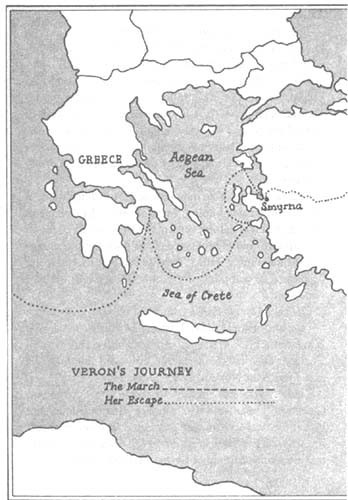
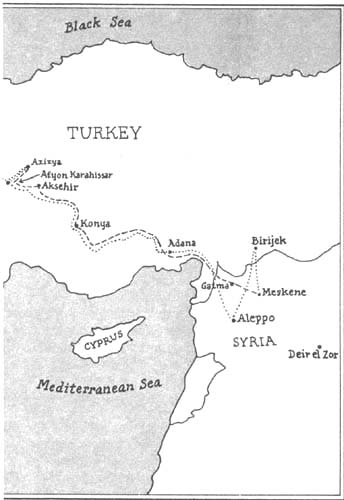
F or as long as I knew the sky and the clouds, we lived in our white stucco house in the Armenian quarter of Azizya, in Turkey, but when the great dome of Heaven cracked and shattered over our lives, and we were abandoned by the sun and blown like scattered seed across the Arabian desert, none returned but me, and my Azizya, my precious home, was made to crumble and fall and forever disappear from my life.
My father had gone to Afyon Karahissar to get his bride, and my grandmother used to say, When he brought our harss [bride] from Afyon, we had music and dancing for one week, and I made thirty-five trays of pahklava [pastry] and thirty trays of khourabia [sugar cookies] for the wedding.
My grandmothers friendsTurkish, Greek and Armenianall said, Where did you find this girl? She looks like a country girl, tall and strong, and with such red cheeks.
My mother was gifted with her fingers, and she was strong and healthy. She was an expert weaver in addition to tending to her housework and her garden of vegetables and flowers.
I remember how she used to make khashkash from the poppy seeds. She would first brown the seeds in a frying pan and then grind them on a special stone. It made a kind of poppy-seed butter, and it was one of our staples. Every time she made a fresh batch she would invite her lady friends over for lunch. My mother was very gay and friendly, and she was always having her friends over because Father was away so much of the time on business.
Everyone in the family was especially fond of my mother, because my aunt, the other bride in my grandmothers home, was delicate and frail and unable to do hard work. She was sick most of the time, and they used to say, Vakh, vakh , our boys life has been burnt; this bride has come to nothing.
At that time, and in that region, a sick bride was considered the worst thing of all. We all lived under one roof then, with my grandparents and aunts and uncles, but when I was five, we moved, with my sick aunt and uncle and cousin, to the new Armenian quarter. There we had the acreage we needed for growing poppies, because my fathers business was harvesting and selling the gum that was used in making opium.
My mother and aunt had grown fond of one another when they lived at Grandmas, and then, when they moved to their new home, which was a duplex, my mother began looking after my aunt. They were the same age, and they had been the brides of my grandmothers house. They were referred to in this way because in the old country tradition the bride, or harss as she was forever after calledhad to travel to the home of the groom. It was not uncommon at that time for four generations to live under one roof. Because my mother had so much energy and was no doubt eager to please and to make a place for herself in this new home, and because she was kind and loving by nature as well, she was eager to help my aunt. So my mother would cook if my aunt was unable to cook, and wash if she was unable to wash, and every day she brought my aunt fresh water from the well before my uncle came home, and the members of the family would say, Everything has turned out for the best since they moved to their new home. Lousapere is growing stronger day by day.
Font size:
Interval:
Bookmark:
Similar books «The road from home: the story of an Armenian girl»
Look at similar books to The road from home: the story of an Armenian girl. We have selected literature similar in name and meaning in the hope of providing readers with more options to find new, interesting, not yet read works.
Discussion, reviews of the book The road from home: the story of an Armenian girl and just readers' own opinions. Leave your comments, write what you think about the work, its meaning or the main characters. Specify what exactly you liked and what you didn't like, and why you think so.


